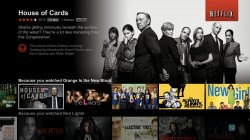Weekly News Roundup (14 September 2014)
It’s going to be a short one this week, as I’ve got somewhere I need to be at shortly after pressing the “submit” button on this WNR. You might then question why, considering I’ve had an entire week to prepare and write this WNR, didn’t I just do it earlier? Because news waits for no man. Or rather, man has to wait for news to happen, and it again happened pretty late during this very quiet week. So quiet that, again, we only have to Australian oriented stories for you this week, although stories that do have global implications. Enjoy!
![]()

Spotify has released research showing piracy rates dropping rapidly in Australia since Spotify’s introduction
After being challenged by those in Australian that believe tougher laws and technological solutions like DRM and censorship are the way forwards for the fight against piracy, Spotify has released data from its own research showing that introducing more affordable legal options is the way to go. According to Spotify’s data, music piracy download rates in Australia (based on calculating BitTorrent downloads) dropped by more than 20% only a year after Spotify’s introduction here in Australia.
The piracy rate has continued to steadily decline since then, proving that if you provide a service people are willing to pay for, they will. Of course, some people will simply never pay for music and will continue to download – but you can’t lose money from people that were never willing to spend it in the first place (the argument is that if the only options were legal options, then some of these people might eventually pay up – but this argument is not valid because it would require piracy to be completely prevented, which even the most optimistic industry person will agree is impossible).
There is this huge amount of resistance to change in the industry, and for them, it’s so much easier to simply blame everyone else for their problems. Piracy has become a convenient excuse, but it’s only just a symptom of a much larger problem the creative industries seems unwilling, or unable to address. It’s all good news for the IT industry though, since (without a sense of entitlement that people in the creative industries, particularly the movie and music industries, seem to have) they’re the ones that are coming up with the solutions at the moment, and bit by bit, they’re the ones inserting themselves into critical junctures of the creative industries.
Despite not wanting to admit the obvious, piracy is also providing competitive pressure for companies that have had it too easy for too long. This is particularly evident in Australia, where many of the major global players, like Netflix, have not been been able to, or willing to influence the market conditions here – very likely because our market is so small that it’s mostly an afterthought for many companies. This lack of competition, the “taking it for granted” nature of the companies that operate here, and our relatively high average salary has meant prices are exorbitant (up to 431% more for TV shows online) compared to almost any other place in the world. But with Netflix predicted to make its debut locally in 2015, and with 200,000 already signing up via various geo-unblocking methods (which is legal here in Australia, thanks to a court case in the 90’s that basically said region control is not acceptable), the pressure is finally on, and some companies have started to respond.
As mentioned last week, one such company, our only cable operator Foxtel, has decided to drop prices to prepare for the Netflix onslaught next year. This is despite the company raising prices annually for the past decade, including at the start of this year (just before rumours started circulating that Netflix was coming). The current debate over the poor value Australians get in terms of what they pay for, and Foxtel’s virtual monopolistic position, has also added to the price cut pressure.
In fact, the general trend recently has seen various companies scramble in full panic mode to try and deal with the arrival of Netflix. We’ve seen indirect competitors, like Foxtel, finally starting to be more competitive price wise, even if at the same time, they’re locking up content so Netflix can’t get their hands on it. It’s very likely that our local Netflix offering will be very much limited compared to overseas equivalents, which may mean that VPNs and geo-unblockers will still have their use. This is why there is still pressure from local companies, and also direct competitors to Netflix, on the government to ban the use of geo-unblockers (again, despite legal precedent ruling that busting geo-restrictions is perfectly legal here in Australia).
While all of this “discussion” is happening under the guise of a “debate” on solving the piracy issue, you can’t help but feel it’s more about local companies trying to protecting their privileged positions in our noncompetitive market – basically to get the government to bail them out now that some real competition is about the arrive. And that, perhaps, is what the piracy debate is all about, not just in Australia – industries that have grown too comfortable with the way they do business and will do everything in their lobbying power to keep the status quo, and prevent new forms of competition from succeeding, whether it’s piracy or Netflix.
![]()
The early NPD stats for August 2014 are out, and no big surprise here. The PS4 outsold the Xbox One to claim the throne as the best selling console eight month in a row. It’s a still a bit early, and so I’m still waiting for other stuff to filter through. I’ll cover the NPD results in more detail next month.
——
That’s it for this edition of the WNR. Not the most interesting, I know, but hopefully stuff will happen (and happen sooner than Friday afternoon, thank-you very much) next week. Until then, have a great one!

